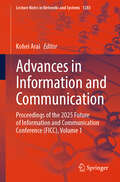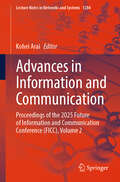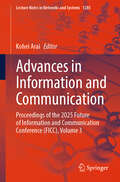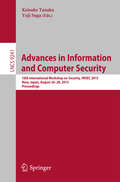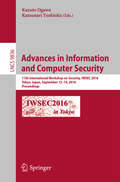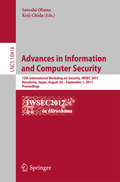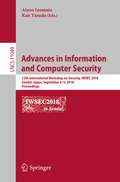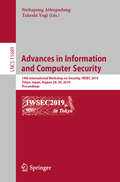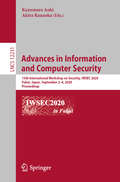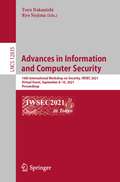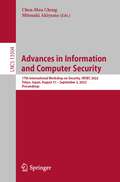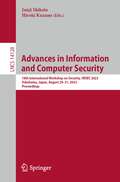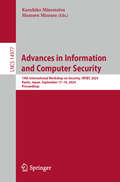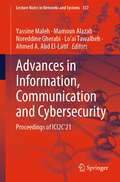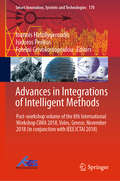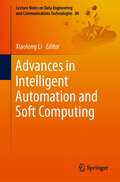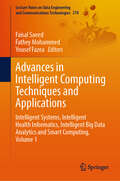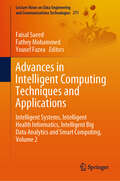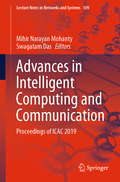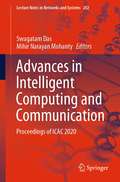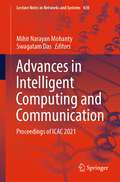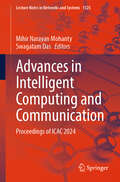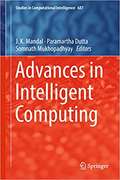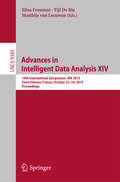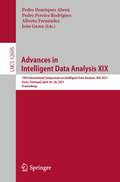- Table View
- List View
Advances in Information and Communication: Proceedings of the 2025 Future of Information and Communication Conference (FICC), Volume 1 (Lecture Notes in Networks and Systems #1283)
by Kohei AraiThis book comprises the proceedings of the Future of Information and Communication Conference (FICC) 2025, held on 28–29 April 2025 in Berlin, Germany. The conference brought together leading researchers, industry experts, and academics from across the globe to discuss the latest advancements, challenges, and opportunities in the rapidly evolving field of information and communication technologies. The conference received an impressive 401 submissions, of which 138 high-quality papers were selected after a rigorous peer-review process. These contributions span a diverse range of topics, including artificial intelligence, cybersecurity, data science, networking, human-computer interaction, and more. FICC 2025 provided an engaging platform for collaboration and knowledge exchange, highlighting state-of-the-art research and practical solutions to global challenges. This proceedings book serves as a valuable resource for researchers, practitioners, and innovators seeking insights into the future of information and communication technologies.
Advances in Information and Communication: Proceedings of the 2025 Future of Information and Communication Conference (FICC), Volume 2 (Lecture Notes in Networks and Systems #1284)
by Kohei AraiThis book comprises the proceedings of the Future of Information and Communication Conference (FICC) 2025, held on 28-29 April 2025 in Berlin, Germany. The conference brought together leading researchers, industry experts, and academics from across the globe to discuss the latest advancements, challenges, and opportunities in the rapidly evolving field of information and communication technologies. The conference received an impressive 401 submissions, of which 138 high-quality papers were selected after a rigorous peer-review process. These contributions span a diverse range of topics, including artificial intelligence, cybersecurity, data science, networking, human–computer interaction, and more. FICC 2025 provided an engaging platform for collaboration and knowledge exchange, highlighting state-of-the-art research and practical solutions to global challenges. This proceedings book serves as a valuable resource for researchers, practitioners, and innovators seeking insights into the future of information and communication technologies.
Advances in Information and Communication: Proceedings of the 2025 Future of Information and Communication Conference (FICC), Volume 3 (Lecture Notes in Networks and Systems #1285)
by Kohei AraiThis book comprises the proceedings of the Future of Information and Communication Conference (FICC) 2025, held on 28-29 April 2025 in Berlin, Germany. The conference brought together leading researchers, industry experts, and academics from across the globe to discuss the latest advancements, challenges, and opportunities in the rapidly evolving field of information and communication technologies. The conference received an impressive 401 submissions, of which 138 high-quality papers were selected after a rigorous peer-review process. These contributions span a diverse range of topics, including artificial intelligence, cybersecurity, data science, networking, human–computer interaction, and more. FICC 2025 provided an engaging platform for collaboration and knowledge exchange, highlighting state-of-the-art research and practical solutions to global challenges. This proceedings book serves as a valuable resource for researchers, practitioners, and innovators seeking insights into the future of information and communication technologies.
Advances in Information and Computer Security: 10th International Workshop on Security, IWSEC 2015, Nara, Japan, August 26-28, 2015, Proceedings (Lecture Notes in Computer Science #9241)
by Keisuke Tanaka Yuji SugaThis book constitutes the proceedings of the 10th International Workshop on Security, IWSEC 2015, held in Nara, Japan, in August 2015. The 18 full papers and 3 short papers presented in this volume were carefully reviewed and selected from 58 submissions. They were organized in topical sections named: identity-based encryption; elliptic curve cryptography; factoring; symmetric cryptanalysis; provable security; LWE-based encryption; privacy-preserving and anonymity; secure protocol; systems security; and security in hardware.
Advances in Information and Computer Security: 11th International Workshop on Security, IWSEC 2016, Tokyo, Japan, September 12-14, 2016, Proceedings (Lecture Notes in Computer Science #9836)
by Kazuto Ogawa Katsunari YoshiokaThis book constitutes the refereed proceedings of the 11th International Workshop on Security, IWSEC 2016, held in Tokyo, Japan, in September 2016. The 15 regular papers and 4 short papers presented in this volume were carefully reviewed and selected from 53 submissions. They were organized in topical sections named: system security; searchable encryption; cryptanalysis; permutation and symmetric encryption; privacy preserving; hardware security; post-quantum cryptography; and paring computation.
Advances in Information and Computer Security: 12th International Workshop on Security, IWSEC 2017, Hiroshima, Japan, August 30 – September 1, 2017, Proceedings (Lecture Notes in Computer Science #10418)
by Satoshi Obana Koji ChidaThis book constitutes the refereed proceedings of the 12th International Workshop on Security, IWSEC 2017, held in Hiroshima, Japan, in August/September 2017. The 11 regular papers and 3 short papers presented in this volume were carefully reviewed and selected from 37 submissions. They were organized in topical sections named: post-quantum cryptography; system security; public key cryptosystems; cryptanalysis; and cryptographic protocols.
Advances in Information and Computer Security: 13th International Workshop on Security, IWSEC 2018, Sendai, Japan, September 3-5, 2018, Proceedings (Lecture Notes in Computer Science #11049)
by Atsuo Inomata Kan YasudaThis book constitutes the refereed proceedings of the 13th International Workshop on Security, IWSEC 2018, held in Sendai, Japan, in September 2018. The 18 regular papers and 2 short papers presented in this volume were carefully reviewed and selected from 64 submissions. They were organized in topical sections named: Cryptanalysis, Implementation Security, Public-Key Primitives, Security in Practice, Secret Sharing, Symmetric-Key Primitives, and Provable Security.
Advances in Information and Computer Security: 14th International Workshop on Security, IWSEC 2019, Tokyo, Japan, August 28–30, 2019, Proceedings (Lecture Notes in Computer Science #11689)
by Nuttapong Attrapadung Takeshi YagiThis book constitutes the refereed proceedings of the 14th International Workshop on Security, IWSEC 2019, held in Tokyo, Japan, in August 2019. The 18 regular papers and 5 short papers presented in this volume were carefully reviewed and selected from 61 submissions. They were organized in topical sections named: Public-Key Primitives; Cryptanalysis on Public-Key Primitives; Cryptographic Protocols; Symmetric-Key Primitives; Malware Detection and Classification; Intrusion Detection and Prevention; Web and Usable Security; Cryptanalysis on Symmetric-Key Primitives; and Forensics.
Advances in Information and Computer Security: 15th International Workshop on Security, IWSEC 2020, Fukui, Japan, September 2–4, 2020, Proceedings (Lecture Notes in Computer Science #12231)
by Kazumaro Aoki Akira KanaokaThis book constitutes the refereed proceedings of the 15th International Workshop on Security, IWSEC 2020, held in Fukui, Japan, in September 2020.* The 15 regular papers and 1 short paper presented in this volume were carefully reviewed and selected from 47 submissions. They were organized in topical sections named: symmetric-key cryptography, malicious activity detection, multiparty computation, post quantum cryptography, privacy, pairing-based cryptography, and machine learning. * The conference was held virtually due to the COVID-19 pandemic.
Advances in Information and Computer Security: 16th International Workshop on Security, IWSEC 2021, Virtual Event, September 8–10, 2021, Proceedings (Lecture Notes in Computer Science #12835)
by Toru Nakanishi Ryo NojimaThis book constitutes the refereed proceedings of the 16th International Workshop on Security, IWSEC 2021, held in Tokyo, Japan in September 2021. The conference was held virtually due to COVID-19 pandemic. The 14 regular papers and 3 short paper presented in this volume were carefully reviewed and selected from 37 submissions. They were organized in topical sections named: Lattice-Based Cryptography; System Security; Multiparty Computation; Machine Learning and Security; Post-quantum Cryptography; Symmetric-key Cryptography; Game Theory and Security.
Advances in Information and Computer Security: 17th International Workshop on Security, IWSEC 2022, Tokyo, Japan, August 31 – September 2, 2022, Proceedings (Lecture Notes in Computer Science #13504)
by Chen-Mou Cheng Mitsuaki AkiyamaThis book constitutes the refereed proceedings of the 17th International Workshop on Security, IWSEC 2022, which took place as a hybrid event in Tokyo, Japan, in August/September 2022. The 12 full papers presented in this book were carefully reviewed and selected from 34 submissions. They were organized in topical sections as follows: mathematical cryptography; system security and threat intelligence; symmetric-key cryptography; post-quantum cryptography; advanced cryptography.
Advances in Information and Computer Security: 18th International Workshop on Security, IWSEC 2023, Yokohama, Japan, August 29–31, 2023, Proceedings (Lecture Notes in Computer Science #14128)
by Junji Shikata Hiroki KuzunoThis book constitutes the refereed proceedings of the 18th International Workshop on Security, IWSEC 2023, which took place as a hybrid event in Yokohama, Japan, during August 29–31, 2023. This event was held in hybrid mode. The 14 full papers presented in this book were carefully reviewed and selected from 47 submissions. They were organized in topical sections as follows: System and Hardware Security; Symmetric Key Cryptography; Public Key Cryptography; Zero Knowledge Proofs; and Card Based Cryptography.
Advances in Information and Computer Security: 19th International Workshop on Security, IWSEC 2024, Kyoto, Japan, September 17–19, 2024, Proceedings (Lecture Notes in Computer Science #14977)
by Mamoru Mimura Kazuhiko MinematsuThis book constitutes the proceedings of the 19th International Workshop on Security on Advances in Information and Computer Security, IWSEC 2024, held in Kyoto, Japan, in September 17-19, 2024. The 14 full papers and 3 short papers were carefully reviewed and selected from 47 submissions. These papers were categorized into the following sections: authenticated encryption; symmetric-key cryptanalysis; protocols; analysis of public-key cryptosystems; vulnerability; malware countermeasure; network security and privacy.
Advances in Information, Communication and Cybersecurity: Proceedings of ICI2C’21 (Lecture Notes in Networks and Systems #357)
by Yassine Maleh Mamoun Alazab Lo’ai Tawalbeh Noreddine Gherabi Ahmed A. Abd El-LatifThis book gathers the proceedings of the International Conference on Information, Communication and Cybersecurity, held on November 10–11, 2021, in Khouribga, Morocco. The conference was jointly coorganized by The National School of Applied Sciences of Sultan Moulay Slimane University, Morocco, and Charles Darwin University, Australia. This book provides an opportunity to account for state-of-the-art works, future trends impacting information technology, communications, and cybersecurity, focusing on elucidating the challenges, opportunities, and inter-dependencies that are just around the corner. This book is helpful for students and researchers as well as practitioners.ICI2C 2021 was devoted to advances in smart information technologies, communication, and cybersecurity. It was considered a meeting point for researchers and practitioners to implement advanced information technologies into various industries. There were 159 paper submissions from 24 countries. Each submission was reviewed by at least three chairs or PC members. We accepted 54 regular papers (34\%). Unfortunately, due to limitations of conference topics and edited volumes, the Program Committee was forced to reject some interesting papers, which did not satisfy these topics or publisher requirements. We would like to thank all authors and reviewers for their work and valuable contributions. The friendly and welcoming attitude of conference supporters and contributors made this event a success!
Advances in Integrations of Intelligent Methods: Post-workshop volume of the 8th International Workshop CIMA 2018, Volos, Greece, November 2018 (in conjunction with IEEE ICTAI 2018) (Smart Innovation, Systems and Technologies #170)
by Ioannis Hatzilygeroudis Isidoros Perikos Foteini GrivokostopoulouThis book presents a number of research efforts in combining AI methods or techniques to solve complex problems in various areas. The combination of different intelligent methods is an active research area in artificial intelligence (AI), since it is believed that complex problems can be more easily solved with integrated or hybrid methods, such as combinations of different soft computing methods (fuzzy logic, neural networks, and evolutionary algorithms) among themselves or with hard AI technologies like logic and rules; machine learning with soft computing and classical AI methods; and agent-based approaches with logic and non-symbolic approaches. Some of the combinations are already extensively used, including neuro-symbolic methods, neuro-fuzzy methods, and methods combining rule-based and case-based reasoning. However, other combinations are still being investigated, such as those related to the semantic web, deep learning and swarm intelligence algorithms. Most are connected with specific applications, while the rest are based on principles.
Advances in Intelligent Automation and Soft Computing (Lecture Notes on Data Engineering and Communications Technologies #80)
by Xiaolong LiThis book presents select proceedings of the International Conference on Intelligent Automation and Soft Computing (IASC2021). Various topics covered in this book include AI algorithm, neural networks, pattern recognition, machine learning, blockchain technology, system engineering, computer vision and image processing, adaptive control and robotics, big data and data processing, networking and security. The book is a valuable reference for beginners, researchers, and professionals interested in artificial intelligence, automation, and soft computing.
Advances in Intelligent Computing Techniques and Applications: Intelligent Systems, Intelligent Health Informatics, Intelligent Big Data Analytics and Smart Computing, Volume 1 (Lecture Notes on Data Engineering and Communications Technologies #210)
by Faisal Saeed Fathey Mohammed Yousef FazeaThis book presents the papers included in the proceedings of the 7th International Conference of Reliable Information and Communication Technology 2023 (IRICT 2023) that was held in Pulai Springs Resorts, Johor, Malaysia on 27-28, December 2023. IRICT 2023 is organized by the Yemeni Scientists Research Group (YSRG) and Big Data Center in Universiti Teknologi Malaysia (Malaysia) in collaboration with Association for Information Systems – Malaysia Chapter (MyAIS) and College of Engineering, IT and Environment at Charles Darwin University (Australia). IRICT2023 is a forum for the presentation of technological advances in the field of Information and Communication Technology. The main theme of the conference is “Advances in Intelligent Computing Techniques and Applications”. The book discusses several research topics such as Health Informatics, Artificial Intelligence, Soft Computing, Data Science, Big Data Analytics, Internet of Things (IoT), Intelligent Communication Systems, Cyber Security, and Information System. These papers were presented in three parallel sessions during the two days.
Advances in Intelligent Computing Techniques and Applications: Intelligent Systems, Intelligent Health Informatics, Intelligent Big Data Analytics and Smart Computing, Volume 2 (Lecture Notes on Data Engineering and Communications Technologies #211)
by Faisal Saeed Fathey Mohammed Yousef FazeaThis book presents the papers included in the proceedings of the 7th International Conference of Reliable Information and Communication Technology 2023 (IRICT 2023) that was held in Pulai Springs Resorts, Johor, Malaysia on 27-28, December 2023. IRICT 2023 is organized by the Yemeni Scientists Research Group (YSRG) and Big Data Center in Universiti Teknologi Malaysia (Malaysia) in collaboration with Association for Information Systems – Malaysia Chapter (MyAIS) and College of Engineering, IT and Environment at Charles Darwin University (Australia). IRICT2023 is a forum for the presentation of technological advances in the field of Information and Communication Technology. The main theme of the conference is “Advances in Intelligent Computing Techniques and Applications”. The book discusses several research topics such as Health Informatics, Artificial Intelligence, Soft Computing, Data Science, Big Data Analytics, Internet of Things (IoT), Intelligent Communication Systems, Cyber Security, and Information System. These papers were presented in three parallel sessions during the two days.
Advances in Intelligent Computing and Communication: Proceedings of ICAC 2019 (Lecture Notes in Networks and Systems #109)
by Swagatam Das Mihir Narayan MohantyThis book features high-quality research papers presented at the 2nd International Conference on Intelligent Computing and Advances in Communication (ICAC 2019), held at Siksha ‘O’ Anusandhan Deemed to be University, Bhubaneswar, Odisha, India, in November 2019. Covering a wide variety of topics, including management of clean and smart energy systems and environmental challenges, it is a valuable resource for researchers and practicing engineers working in various fields of renewable energy generation, and clean and smart energy management.
Advances in Intelligent Computing and Communication: Proceedings of ICAC 2020 (Lecture Notes in Networks and Systems #202)
by Swagatam Das Mihir Narayan MohantyThis book presents high-quality research papers presented at the 3rd International Conference on Intelligent Computing and Advances in Communication (ICAC 2020) organized by Siksha ‘O’ Anusandhan Deemed to be University, Bhubaneswar, Odisha, India, in November 2020. This book brings out the new advances and research results in the fields of theoretical, experimental, and applied signal and image processing, soft computing, networking, and antenna research. Moreover, it provides a comprehensive and systematic reference on the range of alternative conversion processes and technologies.
Advances in Intelligent Computing and Communication: Proceedings of ICAC 2021 (Lecture Notes in Networks and Systems #430)
by Swagatam Das Mihir Narayan MohantyThe book presents high-quality research papers presented at 4th International Conference on Intelligent Computing and Advances in Communication (ICAC 2021) organized by Siksha ‘O’ Anusandhan, Deemed to be University, Bhubaneswar, Odisha, India, in November 2021. This book brings out the new advances and research results in the fields of theoretical, experimental, and applied signal and image processing, soft computing, networking, and antenna research. Moreover, it provides a comprehensive and systematic reference on the range of alternative conversion processes and technologies.
Advances in Intelligent Computing and Communication: Proceedings of ICAC 2024 (Lecture Notes in Networks and Systems #1325)
by Swagatam Das Mihir Narayan MohantyThis book presents high-quality research papers presented at 5th International Conference on Intelligent Computing and Advances in Communication (ICAC 2024) organized by Siksha &‘O&’ Anusandhan, deemed to be university, Bhubaneswar, Odisha, India, in December 2024. This book brings out the new advances and research results in the fields of theoretical, experimental, and applied signal and image processing, soft computing, networking, and antenna research. Moreover, it provides a comprehensive and systematic reference on the range of alternative conversion processes and technologies.
Advances in Intelligent Computing: Proceedings Of The 49th Annual Convention Of The Computer Society Of India Csi (Studies In Computational Intelligence #687)
by Paramartha Dutta Jyotsna Kumar Mandal Somnath MukhopadhyayDiscusses computational intelligence and business analytics in computer science and engineering.<P> Encompasses the latest technological developments from an inter- and intra-disciplinary perspective.<P> Presents hybridization models for solving real-world problems.<P> This edited volume on computational intelligence algorithms-based applications includes work presented at the International Conference on Computational Intelligence, Communications, and Business Analytics (CICBA 2017). It provides the latest research findings on the significance of computational intelligence and related application areas. It also introduces various computation platforms involving evolutionary algorithms, fuzzy logic, swarm intelligence, artificial neural networks and several other tools for solving real-world problems. It also discusses various tools that are hybrids of more than one solution framework, highlighting the theoretical aspects as well as various real-world applications.
Advances in Intelligent Data Analysis XIV: 14th International Symposium, IDA 2015, Saint Etienne. France, October 22 -24, 2015. Proceedings (Lecture Notes in Computer Science #9385)
by Elisa Fromont Tijl De Bie Matthijs Van LeeuwenThis book constitutes the refereed conference proceedings of the 14th International Conference on Intelligent Data Analysis, which was held in October 2015 in Saint Étienne. France. The 29 revised full papers were carefully reviewed and selected from 65 submissions. The traditional focus of the IDA symposium series is on end-to-end intelligent support for data analysis. The symposium aims to provide a forum for inspiring research contributions that might be considered preliminary in other leading conferences and journals, but that have a potentially dramatic impact. To facilitate this, IDA 2015 will feature two tracks: a regular "Proceedings" track, as well as a "Horizon" track for early-stage research of potentially ground-breaking nature.
Advances in Intelligent Data Analysis XIX: 19th International Symposium on Intelligent Data Analysis, IDA 2021, Porto, Portugal, April 26–28, 2021, Proceedings (Lecture Notes in Computer Science #12695)
by João Gama Pedro Henriques Abreu Alberto Fernández Pedro Pereira RodriguesThis book constitutes the proceedings of the 19th International Symposium on Intelligent Data Analysis, IDA 2021, which was planned to take place in Porto, Portugal. Due to the COVID-19 pandemic the conference was held online during April 26-28, 2021.The 35 papers included in this book were carefully reviewed and selected from 113 submissions. The papers were organized in topical sections named: modeling with neural networks; modeling with statistical learning; modeling language and graphs; and modeling special data formats.
